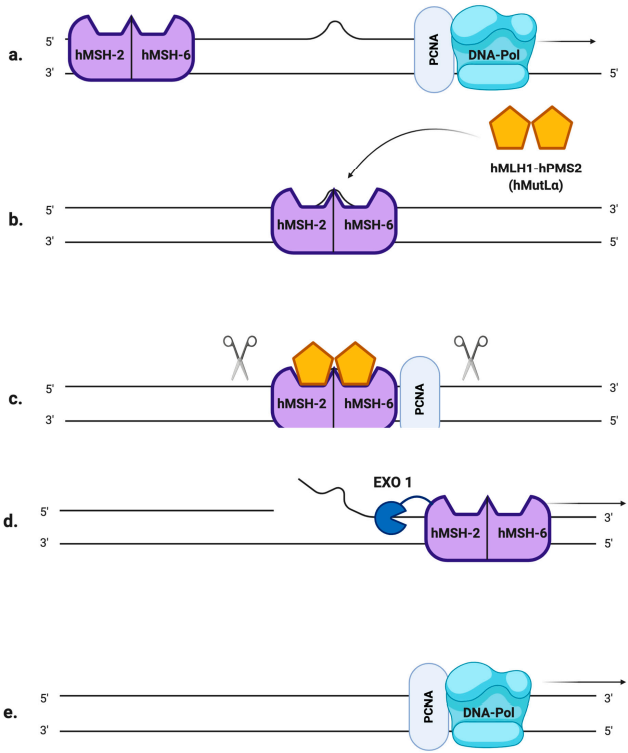Creative Biolabs, a world-leading service provider of antibody generation and development, has established a series of in vitro diagnostic (IVD) antibody development services for diagnostic uses, which are available for clients worldwide. Our scientific group focused on IVD antibody development is pleased to assist you in your projects with a timely and cost-effective way.
hMSH2 Marker
hMSH2, also known as DNA mismatch repair protein Msh2 or MutS protein homolog 2, is a DNA mismatch repair (MMR) protein that is encoded by the MSH2 gene located on chromosome 2. hMSH2, which is originally recognized as a human homologue of the bacterial MutS, is one of the tumor suppressor genes frequently mutated in hereditary non-polyposis colorectal cancer. MSH2 can form a heterodimer with MSH6 to generate the human MutSα mismatch repair complex. It can also dimerize with MSH3 to form the MutSβ DNA repair complex. MSH2 plays a role in several different modes of DNA repair, such as transcription-coupled repair, base excision repair, and homologous recombination. In the MutSα dimer, MSH6 is responsible for interacting with the DNA to recognize mismatch while MSH2 ensures the stability which is repaired by MSH6. The MutSα dimer is able to scan double stranded DNA in the nucleus in order to seek mismatched bases and repair the mutation in an ATP dependent manner when finds one.
 Fig.1 The MMR system.1
Fig.1 The MMR system.1
The Role of hMSH2 in Ovarian Cancer
DNA damage is likely to be the primary underlying pathogeny of tumor, and deficiencies in expression of DNA repair genes seem to trigger several forms of tumor. Studies have indicated that the methylation of the promoter region of MSH2 gene diminishes the MSH2 protein expression. And the insufficient MSH2 protein expression would reduce DNA repair in the four different pathways where MSH2 plays a role: DNA mismatch repair, homologous recombination transcription-coupled repair, and base excision repair. Such declines in DNA repair appear to allow excess DNA damage to accumulate and contribute to carcinogenesis. As it turns out, both losses of heterozygosity and microsatellite instability have been implicated in ovarian carcinogenesis. Loss of expression of hMSH2 has been reported in ovarian cancer and it plays a role in the development of most microsatellite instability phenotypes.
Antibodies are core elements for antibody-based immunoassays for detecting and quantifying antigens of interest in all kinds of samples such as serum, urine, and tissue preparations. With advanced technology and years of experience, Creative Biolabs has launched a whole series of hMLH2-specific antibody development services for the diagnosis and prognosis of ovarian cancer. Additionally, Creative Biolabs also provides diagnostic immunoassay development services targeting this marker. We offer one-stop services from antibody generation to kit manufacture. If you are interested in our services, please feel free to contact us for more details.
Reference
For Research Use Only.
